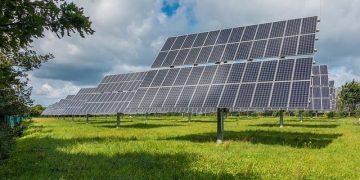In a world increasingly defined by its vulnerabilities—whether they stem from natural disasters, geopolitical tensions, or economic fluctuations—the quest for resilience and independence has never been more urgent. As nations and communities strive to fortify their energy infrastructures, the sun emerges as an unwavering ally, casting its golden promise across rooftops and open fields. Solar energy, once merely a glimmer of futuristic possibility, now stands at the forefront of a transformative shift. It offers not just a path to sustainability, but a beacon of autonomy and resilience in an unpredictable era. This article explores how harnessing the power of the sun is reshaping our approach to energy, empowering societies to illuminate their own paths to a more secure and self-reliant future.
Harnessing the Sun: Building a Resilient Energy Future
Solar energy stands at the forefront of a transformative shift towards energy resilience and independence. As nations strive to insulate themselves from volatile global energy markets and reduce carbon footprints, solar power emerges as a beacon of hope. Harnessing sunlight, an abundant and renewable resource, offers an unparalleled opportunity to decentralize energy production, empowering communities to generate their own electricity. This not only reduces reliance on traditional power grids but also fosters innovation in energy storage solutions and smart grid technology.
- Decentralization: By promoting localized energy production, solar power reduces the vulnerabilities associated with centralized power grids.
- Environmental Benefits: Solar energy significantly lowers carbon emissions, contributing to a cleaner, more sustainable planet.
- Economic Growth: Investment in solar technology spurs job creation in installation, maintenance, and research sectors.
- Energy Security: Solar provides a stable and predictable source of energy, reducing dependence on imported fuels.
Through strategic investments and policy support, solar power can become the cornerstone of a resilient energy future, offering not only environmental and economic benefits but also enhancing energy sovereignty for regions across the globe.

Empowering Communities Through Solar Innovations
In a world increasingly vulnerable to climate change and energy insecurity, solar power stands as a beacon of hope for communities seeking energy resilience and independence. The transformation from traditional energy sources to solar technology is not just an environmental imperative but a socio-economic opportunity. Solar innovations empower communities by providing sustainable, clean, and affordable energy solutions that can be tailored to local needs. By decentralizing energy production, solar technology reduces reliance on centralized power grids, thereby enhancing energy security and autonomy.
Communities that embrace solar energy benefit in multiple ways:
- Economic Savings: Solar installations can significantly lower energy costs, allowing families and local businesses to reinvest savings into their communities.
- Job Creation: The solar industry offers diverse job opportunities, from installation and maintenance to research and development, fostering local employment.
- Environmental Impact: By reducing carbon emissions and reliance on fossil fuels, solar energy contributes to a healthier environment and combats climate change.
- Energy Accessibility: Remote and underserved areas gain access to electricity, improving quality of life and enabling technological advancements.
Ultimately, the widespread adoption of solar energy represents a crucial step towards a more sustainable and self-reliant future for communities worldwide.

Unlocking Energy Independence with Solar Solutions
In an era where energy security is becoming increasingly critical, solar power offers a pathway to both resilience and autonomy. By harnessing the abundant power of the sun, communities can reduce their reliance on traditional energy grids, which are often vulnerable to disruptions. Solar energy systems not only provide a sustainable power source but also enable homeowners and businesses to generate their own electricity, thereby enhancing their energy independence.
- Decentralized Power Generation: Solar installations allow for a more decentralized energy infrastructure, minimizing the risk of widespread outages.
- Cost Efficiency: Once installed, solar panels offer significant savings on electricity bills, insulating consumers from volatile energy prices.
- Environmental Impact: By reducing reliance on fossil fuels, solar power contributes to a cleaner, more sustainable environment.
- Technological Advancements: Innovations in solar technology continue to improve efficiency and accessibility, making solar a viable option for more people.
Embracing solar solutions not only empowers individuals and businesses to take control of their energy needs but also plays a pivotal role in building a resilient energy future. As technology advances and costs continue to decrease, the potential for solar energy to transform our energy landscape becomes increasingly tangible.

Strategic Policies for a Solar-Powered Tomorrow
Embracing the power of the sun requires a blend of innovative policies and strategic foresight. Key to this transition is the implementation of incentives for solar adoption, such as tax credits and rebates, which can make solar technology more accessible to households and businesses alike. Another cornerstone is investment in research and development, focusing on improving solar panel efficiency and storage solutions to harness and utilize solar energy effectively. Furthermore, upgrading infrastructure to accommodate decentralized solar power systems ensures a resilient grid that can withstand disruptions and reduce dependency on fossil fuels.
Additionally, fostering public-private partnerships can accelerate the deployment of solar projects by leveraging the strengths of both sectors. Supporting community solar initiatives allows multiple stakeholders to benefit from shared solar installations, making clean energy more inclusive. Moreover, integrating solar power with smart grid technologies enhances energy management, optimizing consumption and distribution. Policymakers should also emphasize educational programs to raise awareness about the benefits of solar energy, empowering individuals and communities to participate in the clean energy revolution. By adopting these strategic policies, we pave the way for a sustainable and energy-independent future.
In Conclusion
As we stand at the crossroads of innovation and necessity, the role of solar energy in fostering resilience and independence becomes ever more compelling. The sun, a constant in our lives, offers not just warmth and light, but a promise of sustainable power that can transform our energy landscapes. Embracing solar energy is not merely a choice but a strategic move towards a future where energy security is no longer a distant dream but a tangible reality. As we harness this boundless resource, we pave the way for communities to thrive autonomously, shielded from the whims of global energy markets and environmental upheavals. In this journey towards a brighter, more resilient tomorrow, solar power stands as a beacon of hope, illuminating paths yet uncharted and possibilities yet unexplored. Let us continue to innovate, invest, and inspire, ensuring that the sun’s potential is fully realized, guiding us to a future powered by resilience and independence.


































